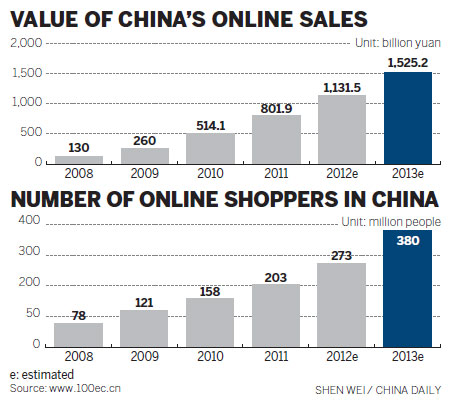Discounting e-commerce firms win 'price war' in H1ha
Updated: 2012-08-08 10:31
By Chen Limin (China Daily)
|
||||||||
The value of online sales in China exceeded half a trillion yuan in the first half of 2012, a result in part of aggressive discounts offered by e-commerce companies to attract customers.
Shoppers spent 511.9 billion yuan ($80.39 billion) online in the first six months of the year, 46.6 percent more than in the same period a year earlier, according to a report by the China e-Business Research Center, a market analysis company based in Hangzhou, Zhejiang province.
Experts said e-commerce companies will continue to offer low prices to attract customers in the second half of the year.
In July, Tmall.com, which arranges sales between businesses and consumers, said it would provide 1 billion yuan in subsidies to sellers and buyers in the last six months of 2012, the third such subsidy it has announced in three months.
That offer came on the heels of various steps e-commerce companies took from April to June to offer prices that are lower than their competitors'. Some companies, such as Beijing Jingdong Century Trading Co Ltd, offered shoppers large discounts.
"E-commerce companies can gain a bigger market share by initiating price wars," said Mo Daiqing, an e-commerce analyst with the China e-Business Research Center.
"And it's also a way to attract potential investors and retain users."
Wu Sheng, senior vice-president of Beijing Jingdong Century Trading Co Ltd, which runs the e-commerce site 360buy.com, said the company plans to maintain its policy of offering low prices in the second half of the year.
"I don't think having a price war is really a central part of e-commerce," he said. "It's just a response to the fact that most online shoppers are very aware of prices."
China was home to 214 million online shoppers by the end of June, up 23.7 percent year-on-year, the report said. It predicted the number will increase to 273 million by the end of the year.
Mo meanwhile said attempts to keep prices low could eventually harm the e-commerce business. While that practice helps attract shoppers, it also places a strain on companies' capital reserves.
Jingdong, for example, reported a net loss of more than 1 billion yuan last year, double the amount of the year before.
Even so, it had the second largest share of the Chinese online market for goods and services sold from businesses to customers - enjoying 20.5 percent of the pie. Tmall, the largest such company in China measured by sales, had a 47.6 percent share, the report said.
In the business of arranging sales among customers in China, Taobao.com remained a dominant force, having a 94.5 percent share of that market during the same period.
chenlimin@chinadaily.com.cn


 Relief reaches isolated village
Relief reaches isolated village
 Rainfall poses new threats to quake-hit region
Rainfall poses new threats to quake-hit region
 Funerals begin for Boston bombing victims
Funerals begin for Boston bombing victims
 Quake takeaway from China's Air Force
Quake takeaway from China's Air Force
 Obama celebrates young inventors at science fair
Obama celebrates young inventors at science fair
 Earth Day marked around the world
Earth Day marked around the world
 Volunteer team helping students find sense of normalcy
Volunteer team helping students find sense of normalcy
 Ethnic groups quick to join rescue efforts
Ethnic groups quick to join rescue efforts
Most Viewed
Editor's Picks

|

|

|

|

|

|
Today's Top News
Health new priority for quake zone
Xi meets US top military officer
Japan's boats driven out of Diaoyu
China mulls online shopping legislation
Bird flu death toll rises to 22
Putin appoints new ambassador to China
Japanese ships blocked from Diaoyu Islands
Inspired by Guan, more Chinese pick up golf
US Weekly

|

|






